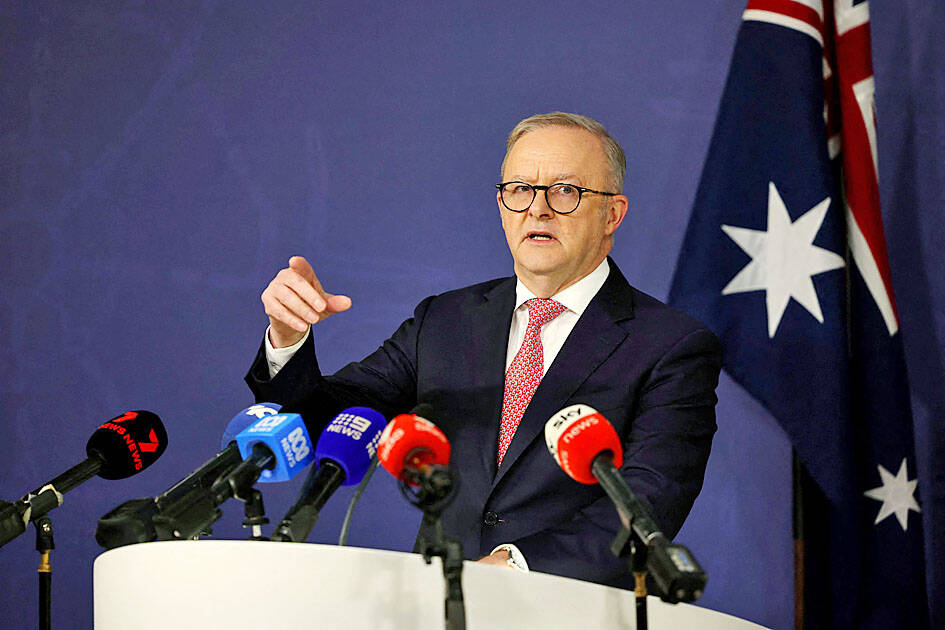A defense deal to be signed this week could see troops from Papua New Guinea (PNG) serve in the Australian military, Canberra said yesterday, the pact seen as an attempt to counter Beijing’s rising Pacific influence.
The fresh defense agreement is scheduled to be signed by Australian Prime Minister Anthony Albanese and Papua New Guinean Prime Minister James Marape tomorrow in Port Moresby as part of celebrations to mark 50 years of Papua New Guinea’s independence from Australia.
Australian Minister for Defence Richard Marles described the deal as “historic.”

Photo: Reuters
He said Australia’s military had been open to foreign nationals from New Zealand, Canada, the UK and the US since last year.
“At the time we said we would have an eye to the Pacific,” he told national broadcaster Australia Broadcasting Corp.
“The agreement that we will sign with PNG contemplates this,” he said.
“There’s more work to be done in terms of walking down that path, but we certainly are interested in how we can recruit Papua New Guineans directly into the ADF [Australian Defence Force],” Marles added.
The agreement follows an overarching security agreement signed between the two nations in 2023.
Australian media said the deal would enable Papua New Guineans to serve in the ADF with the same pay as other members and start a pathway to citizenship.
Speaking in Port Moresby yesterday, Albanese said the deal was an “upgrade in the relationship and its increased interoperability, its increased engagement and security relationship,” Australia Broadcasting Corp reported.
Asked about concerns the deal could infringe on Papua New Guinea’s sovereignty, he said: “People will get to see the agreement, what Australia does is deal with countries with respect and respect for sovereignty is front and center of that.”
Papua New Guinean Minister for Defence Billy Joseph said the deal “promotes regional security.”
“A secure Papua New Guinea is a secure Australia, and a secure Australia is a secure Papua New Guinea,” Joseph said.
Less than 200km from Australia’s northernmost border, Papua New Guinea is the largest and most populous state in Melanesia.
China has committed billions of dollars to Pacific nations over the past decade, funding hospitals, sports stadiums, roads and other public works.
It is an approach that appears to be paying dividends.
The Solomon Islands, Kiribati and Nauru have all severed diplomatic ties with Taiwan in favor of China.
Canberra has stepped up its engagement with the region in a bid to counter Beijing’s influence.
Albanese was in Vanuatu last week to discuss a deal aimed at deepening Australia’s links to that Pacific nation.
However, the deal was not signed, with Vanuatu Prime Minister Jotham Napat citing concerns that its wording would limit his nation’s ability to access funds for “critical infrastructure” from other countries.

CHAOS: Iranians took to the streets playing celebratory music after reports of Khamenei’s death on Saturday, while mourners also gathered in Tehran yesterday Iranian Supreme Leader Ayatollah Ali Khamenei was killed in a major attack on Iran launched by Israel and the US, throwing the future of the Islamic republic into doubt and raising the risk of regional instability. Iranian state television and the state-run IRNA news agency announced the 86-year-old’s death early yesterday. US President Donald Trump said it gave Iranians their “greatest chance” to “take back” their country. The announcements came after a joint US and Israeli aerial bombardment that targeted Iranian military and governmental sites. Trump said the “heavy and pinpoint bombing” would continue through the week or as long

TRUST: The KMT said it respected the US’ timing and considerations, and hoped it would continue to honor its commitments to helping Taiwan bolster its defenses and deterrence US President Donald Trump is delaying a multibillion-dollar arms sale to Taiwan to ensure his visit to Beijing is successful, a New York Times report said. The weapons sales package has stalled in the US Department of State, the report said, citing US officials it did not identify. The White House has told agencies not to push forward ahead of Trump’s meeting with Chinese President Xi Jinping (習近平), it said. The two last month held a phone call to discuss trade and geopolitical flashpoints ahead of the summit. Xi raised the Taiwan issue and urged the US to handle arms sales to

BIG SPENDERS: Foreign investors bought the most Taiwan equities since 2005, signaling confidence that an AI boom would continue to benefit chipmakers Taiwan Semiconductor Manufacturing Co’s (TSMC, 台積電) market capitalization swelled to US$2 trillion for the first time following a 4.25 percent rally in its American depositary receipts (ADR) overnight, putting the world’s biggest contract chipmaker sixth on the list of the world’s biggest companies by market capitalization, just behind Amazon.com Inc. The site CompaniesMarketcap.com ranked TSMC ahead of Saudi Aramco and Meta Platforms Inc. The Taiwanese company’s ADRs on Tuesday surged to US$385.75 on the New York Stock Exchange, as strong demand for artificial intelligence (AI) applications led to chip supply constraints and boost revenue growth to record-breaking levels. Each TSMC ADR represents

State-run CPC Corp, Taiwan (CPC, 台灣中油) yesterday said that it had confirmed on Saturday night with its liquefied natural gas (LNG) and crude oil suppliers that shipments are proceeding as scheduled and that domestic supplies remain unaffected. The CPC yesterday announced the gasoline and diesel prices will rise by NT$0.2 and NT$0.4 per liter, respectively, starting Monday, citing Middle East tensions and blizzards in the eastern United States. CPC also iterated it has been reducing the proportion of crude oil imports from the Middle East and diversifying its supply sources in the past few years in response to geopolitical risks, expanding